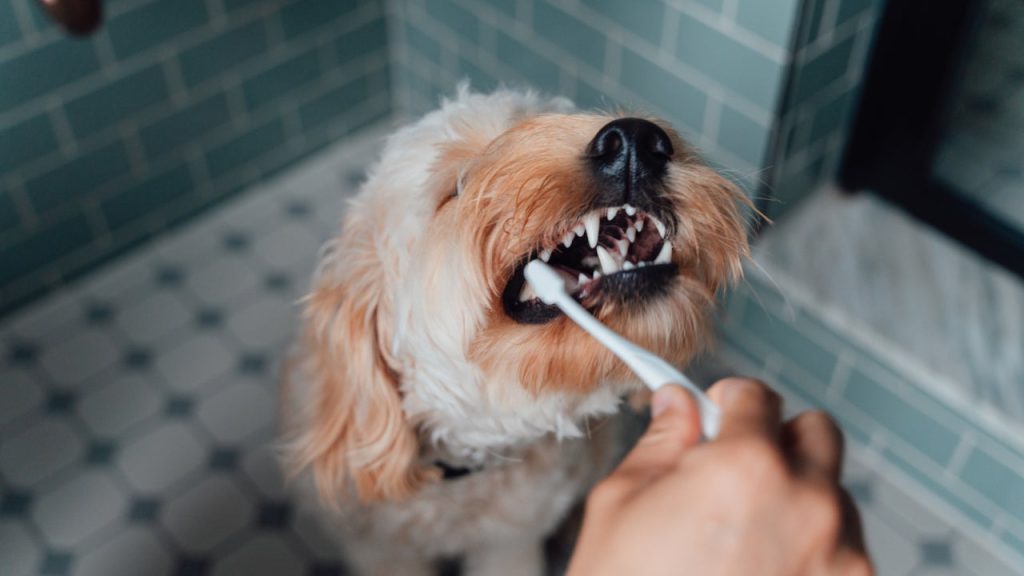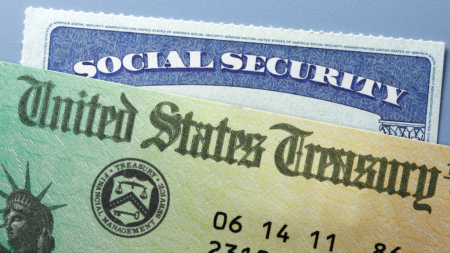Key takeaways
- Dental care is crucial for protecting pets from serious health issues, but procedures can be expensive.
- Many pet insurance companies include dental coverage in their comprehensive plans or as preventive care add-ons.
- Some pet insurance plans cover extractions, accidents, root canals or periodontal treatment, while others might require add-ons. Pre-existing conditions, cosmetic procedures and routine care are often excluded.
- Pet dental insurance can ease financial burdens by covering vet bills for certain unexpected dental emergencies or surgeries.
Caring for your pet’s teeth is about more than just a bright and pleasant-smelling smile — it’s essential for their long-term health and happiness. Like us, dogs and cats can face serious health issues from poor dental hygiene, painful infections and complications affecting their heart, kidneys and overall well-being.
Reality can hit many pet owners when your pup needs an unexpected dental procedure. Cleanings, extractions and surgeries can be costly, but they’re not something you can afford to ignore. That’s where pet dental insurance steps in, helping cover expenses and making it easier to give your pet the dental care they need for a healthy, happy life.
What can I expect from pet dental insurance?
The dental coverage for your pet varies by insurance provider and generally falls into two main categories: dental accidents and dental illnesses.
- Dental accidents, like a chipped or lost tooth, may be treated as standard injury claims under some pet insurance plans. This means you will not need a dental add-on for those repairs.
- Dental procedures to treat and prevent dental illness cover conditions affecting your pet’s oral health, such as gum disease. These generally require additional coverage.
Look carefully at your pet insurance policy to see what is covered. Most pet insurance companies will cover accidental damage to your pet’s teeth, but anything else will require a more comprehensive plan or a preventive care add-on.
What are the pet dental insurance coverages and exclusions?
Here are a few examples of what may be covered under your pet’s dental insurance policy.
Typical dental coverage
- Crowns: Most plans cover dental caps to protect damaged or fractured teeth.
- Extractions: These procedures are necessary when a tooth becomes abscessed, infected or otherwise unsalvagable.
- Gum disease: Intensive cleanings under anesthesia can treat gum disease by removing hardened tartar and plaque.
- Oral inflammation or stomatitis: Medal cleanings or surgical extractions ma be needed depending on the severity of the inflammation.
- Oral surgery: Certain oral surgeries (such as tumor or abscess removal) are covered, depending on your pet’s insurance plan or add-on.
- Periodontal disease treatment: Some plans (mostly preventative care or wellness add-ons) cover treatments such as scaling or polishing to prevent or treat other health issues. Periodontal disease can lead to damaged bones that support the teeth.
- Root canals: Sometimes, the insurer will pay for a root canal procedure to save a damaged tooth.
Common exclusions
- Cosmetic procedures: Dental procedures for cosmetic purposes (such as teeth whitening, implants or fillings) are commonly excluded from coverage.
- Orthodontic procedures: Dogs can wear braces, but like other procedures for correcting teeth alignment, they’re typically not covered.
- Pre-existing conditions: These dental problems diagnosed before your pet’s enrollment (or during their waiting period) are not usually covered by pet insurance plans.
- Routine care: Unless you have purchased a preventive add-on, your insurance will likely not cover the costs of dental cleanings and other routine care.
Certain breed-specific dental conditions
Any dog or cat can develop dental disease, but genetics play a role in specific dental issues that standard policies might not cover. From the shape of their jaws to the alignment of their teeth, a dog’s breed can profoundly impact its oral well-being.
Watch out for the following dental conditions if you have one of the following dog breeds:
- Boxers, mastiffs and Great Danes have overgrown gums that can lead to gingival hyperplasia, an inflammatory response caused by excess plaque.
- Brachycephalic dog breeds like Boston terriers, bulldogs and pugs may have teeth that fail to erupt (grow out) properly due to incorrect jaw positioning. The overcrowding and misalignment of teeth in the jaws of many brachycephalic breeds make them more prone to bacterial build-up and periodontal disease.
- Brachycephalic cat breeds include Persians, Burmese, British shorthair and more. The shape of their skull can result in dental infections, misalignment of the teeth and abnormal tooth development that’s painful and makes eating tricky.
- Yorkshire terriers, Pomeranians, Maltese poodles and other small dog breeds are known for having persistent deciduous teeth. This means that their baby teeth and adult teeth occupy the same space. The ramifications include periodontal disease due to food getting stuck in hard-to-clean spaces and adult teeth failing to grow out or protruding at incorrect angles.
- Toy and miniature poodles, dachshunds, cocker spaniels and Jack Russell terriers are most frequently affected by periodontal disease.
- Overweight cats and dogs are more at risk of periodontal disease.
If you have a pet prone to dental disease due to genetics, it’s best to enroll in pet insurance while they’re young. Because coverage details may be hidden in the fine print, it’s worth contacting the company’s customer service or your broker if you have any questions. Then, care for their teeth with regular checkups and cleanings.
What does pet dental insurance cost?
The cost of pet insurance is between $17 (accident-only plan) and $56 (accident and illness plan) monthly for dogs. For cats, the costs range from $10 (accident-only) to $32 (accident and illness plan).
However, these accident or accident and illness plans have limited dental coverage for dogs and cats. Preventive care and wellness plans offer additional dental coverage, with some companies having specific dental illness add-ons.
With the best wellness plans, you can expect to pay an additional $9.50 to $52.09, depending on the coverage details, your pet’s age, breed and location.
How does pet dental coverage work?
Prevention is better than a cure, but accidents and deterioration happen. When they do, having pet dental insurance can soften the financial blow of the inevitable high vet bill.
“In my practice, I see too many cases where a dog’s dental problems become a financial burden for their owners,” says veterinarian Dr. Melissa Meyer. “While I can offer treatment options, the reality is, some procedures can be quite expensive. Witnessing the disappointment and frustration when cost becomes a barrier to proper care is truly disheartening. My best advice for pet owners? Consider pet insurance with a dental add-on. It’s an investment that can make a world of difference in your dog’s well-being and your own peace of mind down the road.”
Let’s say Goldie, a five-year-old golden retriever, has a cracked tooth due to playing a little too rough at the park. The tooth is starting to look inflamed, and it’s causing pain. You take her to the vet to avoid further breakdown of the tooth and help Goldie feel more comfortable.
Here’s an example of what the cost breakdown could look like with vs. without dental insurance:
Without dental insurance
- Veterinarian bill: This can vary depending on your location and veterinarian, but expect costs to range from $500 to $2,500 for the vet visit and any necessary dental procedures. In this scenario, Goldie’s vet bill amounts to $1,500.
- Your cost: You’d be responsible for the full $1,500.
With dental insurance
- Veterinarian bill: $1,500
- Deductible: $100
- Coinsurance: 30 percent
- Insurance reimbursement: $980 (70 percent of the bill after deductible is covered by insurance)
- Your Cost: $420 (deductible + coinsurance)
As you can see, dental pet insurance or wellness add-on can significantly reduce out-of-pocket dental procedure costs.
How do I save on pet dental care?
Regardless of whether you have pet dental insurance, you can prepare for and prevent excessive pet dental health costs:
- Feed your pet a healthy diet: Feed your pet a balanced diet that promotes dental health.
- Shop around: Compare insurance policies and veterinary clinics to find the best rates.
- Use reimbursement benefits: Utilize your dental insurance’s reimbursement benefits for preventive care to catch issues early.
- Take preventive measures: Regularly brush your pet’s teeth and provide dental chews to reduce plaque build-up.
- Save for a rainy day: Set aside money for deductibles and coinsurance to manage unforeseen vet bills.
Does pet dental care matter for your pet’s health?
Regular dental check-ups and cleanings can prevent many problems, ensuring your pet remains healthy and happy. Spotting changes in their eating habits may indicate dental discomfort.
Poor dental health can lead to:
- Behavioral changes: Pets in pain may become irritable or aggressive, leading to behavioral issues.
- Pain and discomfort: Dental issues can cause significant pain and discomfort, affecting your pet’s quality of life.
- Systemic health issues: Oral bacteria can enter the bloodstream and affect organs such as the heart, liver and kidneys.
“Proactive dental care for dogs is vital,” says Dr. Meyer. “Regular brushing and dental checkups can significantly reduce the risk of future complications like pain, tooth loss and even systemic health issues. Investing in good dental hygiene practices now can ensure your canine companion enjoys a healthy mouth and a happy life for years to come.”
Which pet insurance companies offer dental coverage?
Look into one of the following pet insurance companies for dental care coverage:
Next steps
Looking after your pet and keeping it healthy can be expensive, but it’s often worth the companionship. A comprehensive pet insurance plan or wellness add-on can help pay those hefty veterinary bills, especially when caring for their teeth.
If you are wondering whether pet insurance is worth the cost, explore alternative financing options such as a pet savings account, medical credit card or a pet loan. Regardless of your choice, it’s important to make an informed decision that benefits your pet’s dental and overall hygiene, along with your financial well-being.
Frequently asked questions
Read the full article here












